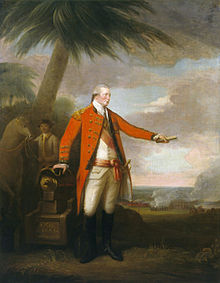Hector Munro, 8th of Novar
|
General Sir Hector Munro KB |
|
|---|---|
 |
|
| Member of Parliament for Inverness Burghs | |
|
In office 1801–1802 |
|
| Preceded by | Parliament of Great Britain |
| Succeeded by | Alexander Cumming-Gordon |
|
In office 1768–1801 |
|
| Preceded by | Sir Alexander Grant, Bt |
| Succeeded by | Parliament of the United Kingdom |
| Personal details | |
| Born | 1726 Ross, Scotland |
| Died | 27 December 1805 (aged 78–79) Scotland |
| Awards | Knight Companion of the Order of the Bath |
| Military service | |
| Allegiance |
|
| Service/branch |
|
| Years of service | 1747–1782 |
| Rank | General |
| Unit | Loudon's Highlanders, 31st Foot, 34th Foot, 48th Foot, 70th Foot, 89th Foot |
| Commands | Commander-in-Chief, India |
| Battles/wars |
Jacobite Rebellion Battle of Buxar Second Anglo-Mysore War |
General Sir Hector Munro, 8th laird of Novar KB (1726 – 27 December 1805) was a British soldier who became the ninth Commander-in-Chief of India (1764–1765).
The son of Hugh Munro of Novar, in Ross, Scotland, he was commissioned into the 64th (Loudon's Highlanders) Regiment of Foot in 1747. Hector is said to have got his first commission in the army after helping the Duchess of Gordon who was travelling alone in Sutherland. Hector took over from a drunken coachman and brought her to safety, the Duchess later used her influence to procure him a Lieutenants commission in the 64th. On the regiment's disbandment in 1749 he transferred to the 48th Foot.
Hector's family home was at Novar House early maps call it 'Tenuer' (Scottish Gaelic: Tigh 'n fhuamhair, house of the giant).
In 1754 Munro transferred to the 31st Foot as a lieutenant. Also in 1754, Hector Munro was ordered to Badenoch with three squadrons of Dragoons to apprehend certain rebels in that district, with special instructions to apprehend John Dubh Cameron, better known as "Sergent Mor". Hector Munro captured Cameron after he was betrayed by a local farmer. John Cameron was soon afterwards executed in Perth.
Hector Munro was also tasked with capturing Ewen MacPherson of Cluny, who took part in the Jacobite Rising of 1745. However Macpherson evaded Munro's grasp and escaped to France. Macpherson tradition is that one day Munro, with a large party of soldiers, surrounded Macpherson's house. With no means of escape, Macpherson dressed himself as a footman or groom, came forward and held Lieutenant Munro's horse while Munro searched his house for him. On return Munro is said to have handed the groom a shilling and then rode off. Another version of the story, however, is that Munro of Novar actually knew Cluny quite well and winked at him as he threw him the grooms fee.
...
Wikipedia
